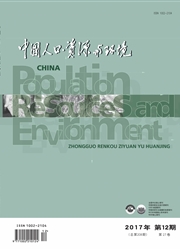

 中文摘要:
中文摘要:
产业间的合作在不同区域中呈现出不同的形式,这会导致基于其建立的水资源合作联盟形式各异,进而会影响区域内合作水资源的整体收益。为优化"京津冀"区域内的水资源配置,本文基于产业合作的群链模式机理和模糊联盟博弈思想,提出了一种具有三阶段结构的"京津冀"区域水资源配置模式。在第一阶段,以满足"京津冀"区域居民生活用水需求并兼顾产业间的水资源配置公平为目标,通过构建水资源一次配置模型,进行区域内各用水主体间的一次配置;在第二阶段,针对"京津冀"区域内产业间合作的群链结构,分析产业间进行水资源模糊合作博弈可能出现的模糊联盟形式,进而构建出水资源二次配置模型以实现水资源收益(效率)最大化,二次配置模型采用"优先规则"建立各水资源合作模糊联盟的支付函数,将"京津冀"区域内所有产业用水主体在第一阶段配置中获得的水资源按一定比率配置到各联盟中;在第三阶段,考虑模糊联盟的稳定性,采用模糊shapley值法对第二阶段配置后各模糊联盟的收益分配给产业用水主体。本文运用算例对上述水资源配置模式的有效性进行了验证。算例分析结果显示:(1)"京津冀"区域内各产业间合作关系为群链模式时,各产业通过形成多种形式的水资源合作模糊联盟,获得比其单独利用水资源时更高的用水收益;(2)京津冀区域内各产业的总体用水收益也高于各产业单独利用水资源时的总用水收益。即本研究中的水资源配置模式有效。因此,该水资源配置模式可为产业合作关系为群链模式的区域,在进行产业间水资源优化配置时提供决策参考。
 英文摘要:
英文摘要:
Industrial cooperation structure, the basis of water cooperation structure, which affects the overall revenue of available water resources since water cooperative coalition patterns, varies by industrial cooperation structure. In this paper, a novel 3-step methodology based on the cluster industrial chain mechanism and the fuzzy cooperative game is developed, which aims at optimal allocation of available water resources and benefits to water users in the Beijing-Tianjin-Hebei region. In its first step, to satisfy the necessary living water requirement of the residents and balance the equity, the first time water resources allocation model is proposed for allocating the water resources among all water users in the region. In its second step, all possible fuzzy coalitions are defined according to the structure of cluster industrial chain in the Beijing-Tianjin-Hebei region, and an optimization model based on priority rule is developed in order to maximize the net benefit. In this step, the characteristic function of the fuzzy cooperative game is utilized to reallocating the initial water allocations to these coalitions in certain proportion. In its third step, the total net benefit of all fuzzy coalitions will be reallocated to industrial water users (players) in a rational and equitable way by using Fuzzy Shapley Value game. This methodology is examined by applying it to a case study of water resources allocation in the Beijing-Tianjin-Hebei region. The results showed that: (1)considering the existence of cluster industrial chain, the water users can gain more benefits than what they do alone without participating in any fuzzy coalitions ; and (2) the overall benefits of the region are higher if the players participate in fuzzy coalitions rather than not participating in any coalition. The proposed methodology can provide rational water and benefit allocation in regions with cluster industrial chain.
 同期刊论文项目
同期刊论文项目
 同项目期刊论文
同项目期刊论文
 期刊信息
期刊信息
